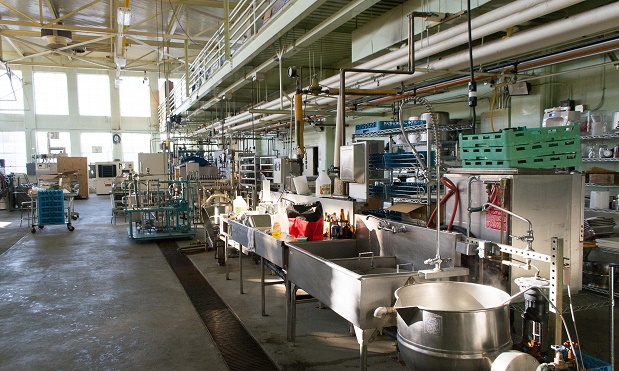 The question on everyone lips within the industry is, ‘Who is going to drive the industry forward?’
The question on everyone lips within the industry is, ‘Who is going to drive the industry forward?’The food manufacturing industry is much more significant to the UK economy than you have probably ever considered; responsible for 16% of all UK manufacturing, and with an annual turnover of £80 billion it’s undeniably important. But despite the enormity of the industry and the increased global demand for FMCG products – it’s currently facing a severe talent and skills shortage.
The question on everyone lips within the industry is, ‘Who is going to drive the industry forward?’
The Food and Drink Federation released a report titled ‘Unlocking Talent’ that cited that out of the five indicators of growth, it’s employment that is failing, only having increased by 0.8% in the last seven years. When you compare this to the fact that the industry as a whole, grew by 11%, it’s a worrying figure.
The industry will need 137,000 by the end of 2017 – and as the days go by this seems like an increasingly unattainable figure. Those working within the sector are paid well – the salaries are on average, 5% higher than the national average, so what’s the issue here?
In an EEF report, 35% of respondents cited that manufacturing vacancies were simply ‘hard to fill’ and this was a major issue in their business. Many laid the blame at a lack of technical skills, relevant qualifications and knowledge, and perhaps the cause for most concern – an insufficient number of applications.
While the lack of interest in the sector is worrying, the industry itself must look introspectively. It has adopted a sluggish approach to cultural shifts when it comes to consumer demand and little to no regard for future talent.
The culture and environment are remnants of the legacy left by the founding fathers of the ‘old boys network’ and in today’s society, are outdated and stagnated. There is a ‘profits over people’ mind-set; it’s a throwaway culture where people hop from job to job and money clouds judgement.
It’s as if the industry fears change; from experience, we could argue that there is no welcome party for innovative and disruptive young talent who would challenge the traditional, draconian processes. It seems that all is required is are compliant individuals who can follow instructions without questions or suggestions. This type of candidate is becoming harder to find, the millennial generation strive for collaboration, transparency and innovation, especially if it involves the adoption of new technology; they are searching for positions that offer everything that the FMCG industry currently shy’s away from.
There are over 6000 SME’s within the FMCG sector and the majority of them are required to focus on meeting the demands placed on them by retailers; in short, they simply don’t have the resources to change the firefighting approach to their talent shortage and rely heavily on interim positions – a false economy.
A lack of emphasis on staff retention and progression is also one of the reasons that fresh talent is being turned off. There is little on offer in the way of employee progression and even less current investment into the infrastructure; we are strongly urging clients to refrain from spending their time and budget on external branding and instead, concentrate their efforts internally.
Identifying what they currently offer their staff and how this can be improved upon to entice a higher calibre of future candidates, would be a far better investment – it seems that currently, employer branding is lost on the FMCG industry.
Through fostering a culture that promotes employee happiness, and therefore engagement and implementing a solid employee progression program is one way to ensure that a company is a far more attractive option and has the competitive edge when it comes to securing talent. You can guarantee that millennials are not interested in working for a business that operates with a draconian hierarchal structure, it’s 2017 – managers are ‘out’ and leaders are ‘in’.
Failing to fall into line with this new level of expectation ultimately means that the life expectancy of businesses within the FMCG sector will be severely reduced.
Perhaps some of the blame can be placed on graduates, who enter the sector with high hopes but almost no experience; when their sky-high expectations aren’t met, and their ambitions aren’t acknowledged – they move on. Finding those ‘lifer’ employees in the FMCG sector is rare, but if there were clear career progression paths, this could very well be the catalyst for change.
Its widely known that millennials simply aren’t willing to sacrifice their personal lives in order to advance their careers. They desire a work/life balance, and a company that can accommodate this, but right now, this is a difficult concept to find in the industry.
However, as family structures have changed, personal development is high on the agenda and today’s young workforce are looking to redefine traditional working concepts and processes in order to align their values with their careers.
It’s high time that the FMCG sector put a stop to the perpetual recruitment and refocused on their foundations to ensure they are aligning themselves with modern cultural expectations. For an industry that is so pivotal to the overall success of UK manufacturing and often described as ‘dynamic’, there simply isn’t enough being done to secure its future.
By Lukas Vanterpool, Director at The Sterling Choice www.thesterlingchoice.com
Join Over 40,000 Recruiters. Get our latest articles weekly, all FREE – SEND ME ARTICLES
Recruiters love this COMPLETE set of Accredited Recruitment & HR Training – View Training Brochure








